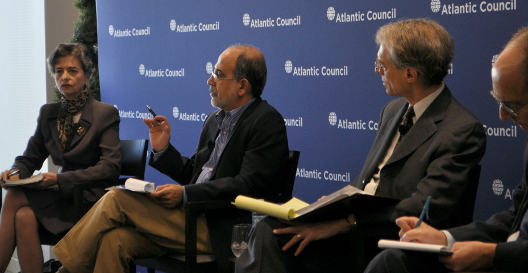 Hassan Rouhani’s election as president of Iran in June led to an upsurge of speculation that Iranian policies, particularly in foreign policy, would begin to change The Iran Task Force of the South Asia Center on Nov. 20 presented a paper on Rouhani’s first hundred days by senior fellows Yasmin Alem and Barbara Slavin. They were joined in a panel discussion by Hadi Semati, a former professor of political science at the University of Tehran; Greg Thielmann, senior fellow with the Arms Control Association; and Clifford Kupchan, the director of the Eurasia Group.
Hassan Rouhani’s election as president of Iran in June led to an upsurge of speculation that Iranian policies, particularly in foreign policy, would begin to change The Iran Task Force of the South Asia Center on Nov. 20 presented a paper on Rouhani’s first hundred days by senior fellows Yasmin Alem and Barbara Slavin. They were joined in a panel discussion by Hadi Semati, a former professor of political science at the University of Tehran; Greg Thielmann, senior fellow with the Arms Control Association; and Clifford Kupchan, the director of the Eurasia Group.
Related ContentRead and download the Issue Brief here |
Alem, the lead author of the report, stated that, while one hundred days is a short and arbitrary time frame, it does provide a sense of where the Rouhani government is going. She summed up Rouhani’s policies as “conciliation abroad and consolidation at home.” Rouhani has put most of his emphasis on foreign policy and on achieving a nuclear agreement with the five permanent members of the UN Security Council plus Germany. Alem warned that failure to reach a deal would deprive Rouhani of domestic support, forcing him to take more hardline positions.
Semati agreed that it is early to judge Rouhani, but expressed optimism that Iran is at a political turning point. He credited Rouhani with putting together a fairly competent, technocratic team of ministers and noted that the Iranian population is tired of extremist politics. Turning to the nuclear talks, Thielmann argued that Iran’s actions on the ground are consistent with Rouhani’s rhetoric. Thielmann noted that Iran has voluntarily put limits on its nuclear advances while negotiations proceed in Geneva. “There is essentially a pause in what had been a worrisome increase in activities that could lead to nuclear weapons,” Thielmann said. He also remarked on a Nov. 11 agreement between Iran and the International Atomic Energy Agency to increase scrutiny of Iran’s nuclear installations. So far, however, Iran is insisting on keeping its nuclear infrastructure intact, so that if an agreement is not reached or if other countries do not act in good faith, Iran’s current restraint could be reversed.
Kupchan addressed challenges to a nuclear deal, including influential actors who actively oppose an agreement, including members of the US Congress, Israel, and Saudi Arabia. Kupchan also provided a more pessimistic view of Rouhani’s foreign policy, noting that a nuclear agreement would not guarantee détente between Iran and the United States or impact Iran’s regional policies, particularly toward Syria, Hezbollah and Iraq.
While Rouhani is focused on a nuclear agreement to achieve relief of crippling sanctions and revive the Iranian economy, success in Geneva, according to Thielmann and Alem, would give Rouhani greater leeway to make progress in areas such as human rights where Rouhani’s performance so far, Alem said, had been a “mixed bag.” Failure, however, will likely empower the hardliners within Iran, while the Iranian economy, particularly for the middle class, continues to deteriorate.
